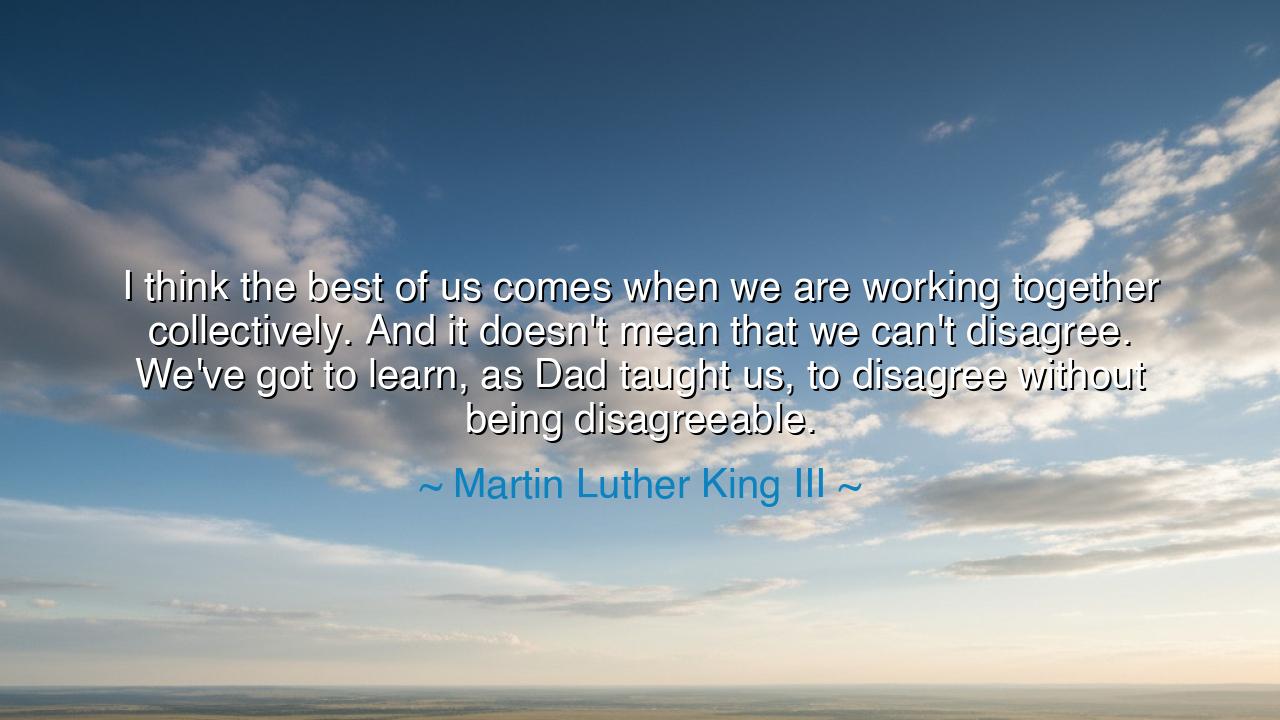
I think the best of us comes when we are working together
I think the best of us comes when we are working together collectively. And it doesn't mean that we can't disagree. We've got to learn, as Dad taught us, to disagree without being disagreeable.






In the spirit of wisdom passed from father to son, Martin Luther King III once said: “I think the best of us comes when we are working together collectively. And it doesn’t mean that we can’t disagree. We’ve got to learn, as Dad taught us, to disagree without being disagreeable.” These words, gentle yet resolute, echo through time like a sacred chord struck in the heart of humanity. They remind us that unity is not the absence of conflict, but the mastery of compassion amidst difference. For as his father, Dr. Martin Luther King Jr., taught the world—peace is not simply the silence of guns, but the harmony of souls striving together for justice.
To the ancients, the essence of this teaching would have been called civic virtue—the wisdom of working together for the common good, even when thoughts diverge and passions rise. For no great civilization was ever built by one alone. The pyramids, the cathedrals, the republics of old—each was raised by hands joined in purpose. But such unity demands humility, patience, and the discipline to see beyond self. Martin Luther King III speaks, therefore, not merely of cooperation, but of the higher art of community, where disagreement becomes not a wall but a bridge, not a wound but a dialogue.
The origin of his words reaches deep into his lineage. His father’s life and death were testaments to this sacred principle—that love is stronger than division, and that disagreement, when governed by dignity, can lead not to destruction but to transformation. Dr. King faced a nation torn by hatred and fear, yet he refused to mirror that hatred back. He taught that to “disagree without being disagreeable” is to choose light when shadow beckons, to argue not to win but to understand. His son, in repeating this truth, calls upon us to rise to that same maturity of spirit—to speak boldly, yes, but never cruelly; to challenge injustice, but never lose sight of the humanity of those we oppose.
Consider the story of Nelson Mandela, who after twenty-seven years of imprisonment, emerged not with bitterness but with grace. When South Africa stood on the brink of civil war, Mandela chose reconciliation over revenge. He disagreed fiercely with those who oppressed his people, yet he met them not with vengeance, but with vision. He sat at the table of his former enemies and built a nation from the ashes of distrust. In his life we see the living proof of Martin Luther King III’s words: that the best of humanity shines not in conquest, but in cooperation; not in dominance, but in dialogue.
It is easy to unite with those who agree with us, but true harmony is tested in the clash of differences. To work collectively is to accept that others will challenge our certainties, will bring their own truths to the table. But this tension, when held with respect, becomes the forge of greatness. Like iron sharpening iron, disagreement—tempered by goodwill—creates strength. As the ancients taught, the universe itself is built on opposing forces—day and night, fire and water, life and death—and from their balance arises creation. So too with humanity: from the balance of perspectives arises progress.
And yet, the heart of the quote lies in its humility. “As Dad taught us,” Martin reminds us, for wisdom is not born in isolation—it is inherited, refined, and renewed. The father’s vision lives on in the son’s voice, not as repetition, but as continuation. In a world ever divided by race, creed, and politics, these words are not merely nostalgic—they are urgent prophecy. For without the ability to disagree respectfully, societies crumble into noise; without the grace of listening, freedom becomes chaos.
Let this then be the teaching for all who hear: seek unity, not uniformity. Work with others, even when your views differ. Speak truth, but temper it with kindness. Remember that the goal of argument is not victory, but understanding; not the silencing of others, but the awakening of all. When you find yourself in conflict, pause and recall the lineage of peace that Martin Luther King III honors—one born of struggle, carried by courage, and sustained by love.
And so, as the ancients would conclude: harmony is not the stillness of the world, but its most beautiful movement. When we learn, as Dr. King taught and his son reminds us, to disagree without being disagreeable, we do more than preserve civility—we preserve the soul of humanity itself. For in such harmony, small things grow into greatness, and even the most divided hearts find their way back to peace.






AAdministratorAdministrator
Welcome, honored guests. Please leave a comment, we will respond soon